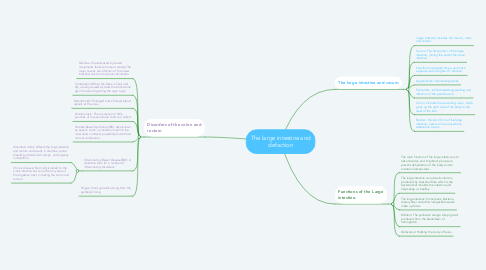The large intestine and defaction
by Jade Parnell


1. The large intestine and cecum
1.1. Large intestine: Includes the Cecum, colon and rectum.
1.2. Cecum: The first portion of the large intestine, joining the end of the small intestine.
1.3. Vermiform appendix: Has a worm like appearance and fights off infection.
1.4. Appendicitis: Inflamed appendix
1.5. Peritonitits: A life threatening swelling and infection of the peritonecum.
1.6. Colon: Includes the ascending colon, which goes up the right side of the body to the level of the liver.
1.7. Rectum: the last 20 cm of the large intestine, opens to the anus where defecation occurs,
2. Functions of the Large intestine.
2.1. The main function of the large intestine is to absorb water, and important process to prevent dehydration of the body and to maintain homeostasis.
2.2. The large intestine can absorb vitamins produced by intestinal flora which is the bacteria that inhabits the intestine and helps keep us healthy.
2.3. The large intestine forms feces, Bacteria, dietary fiber and other indigestible waste make up feces.
2.4. Billrubin: The yellowish orange bile pigmant produced from the breakdown of hemoglobin.
2.5. Defecation: Ridding the body of feces
3. Disorders of the colon and rectum
3.1. Diarrhea: Characterized by bowel movements that are loose or watery.The major causes are infection of the lower intestinal tract and nervous stimulation.
3.2. Constipation:When the feces is hard and dry, usually caused by diets that lack whole grain food and ignoring the urge to go
3.3. Hemorrhoids: Enlarged and inflamed blood vessels at the anus.
3.4. Diverticulosis: The occurence of little pouches of mucosa where food can collect
3.5. Irritable Bowel Syndrome (IBS): Also known as spastic colon, a condition in which the muscularis contracts powerfully but without normal cordination.
3.6. Inflammatory Bowel Disease(IBD): A collective term for a number of inflammatory disorders.
3.6.1. Ulcerative colitis: Affects the large intestine and rectum and results in diarrhea, rectal bleeding, abdominal cramps, and urgency in defaction.
3.6.2. Chrons disease: Normally isolated to the small intestine but can affect any area of the digestive tract, including the colon and rectum.

